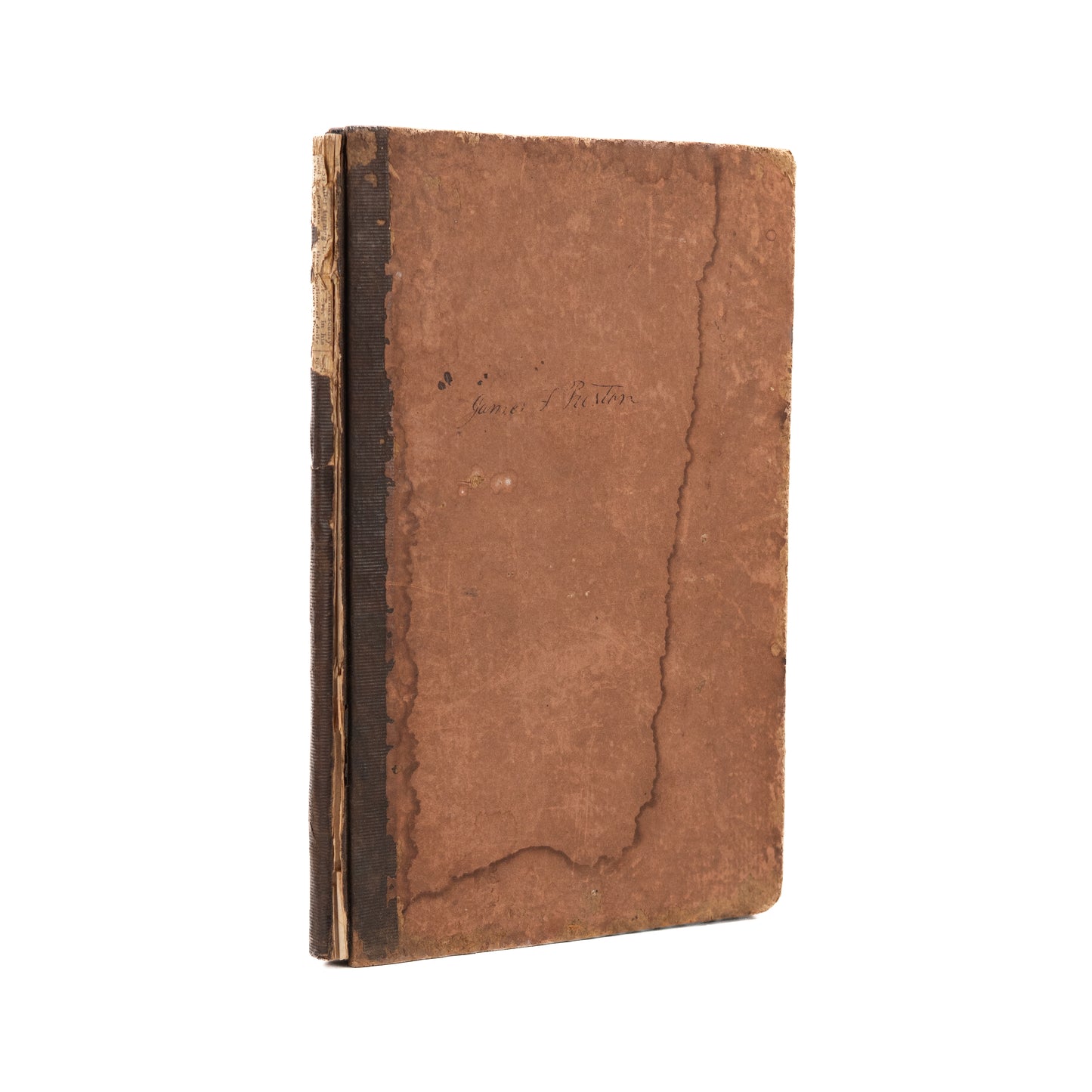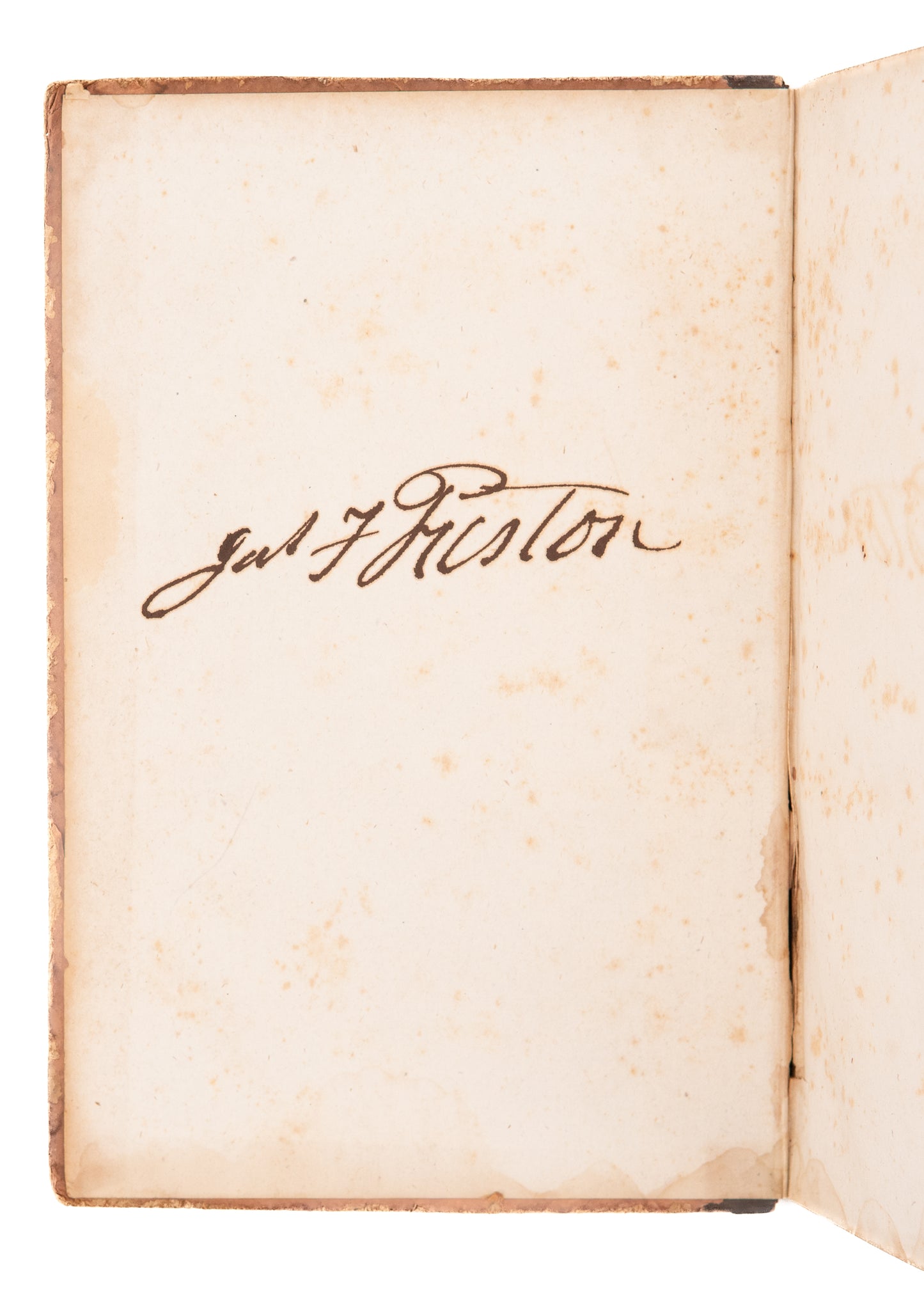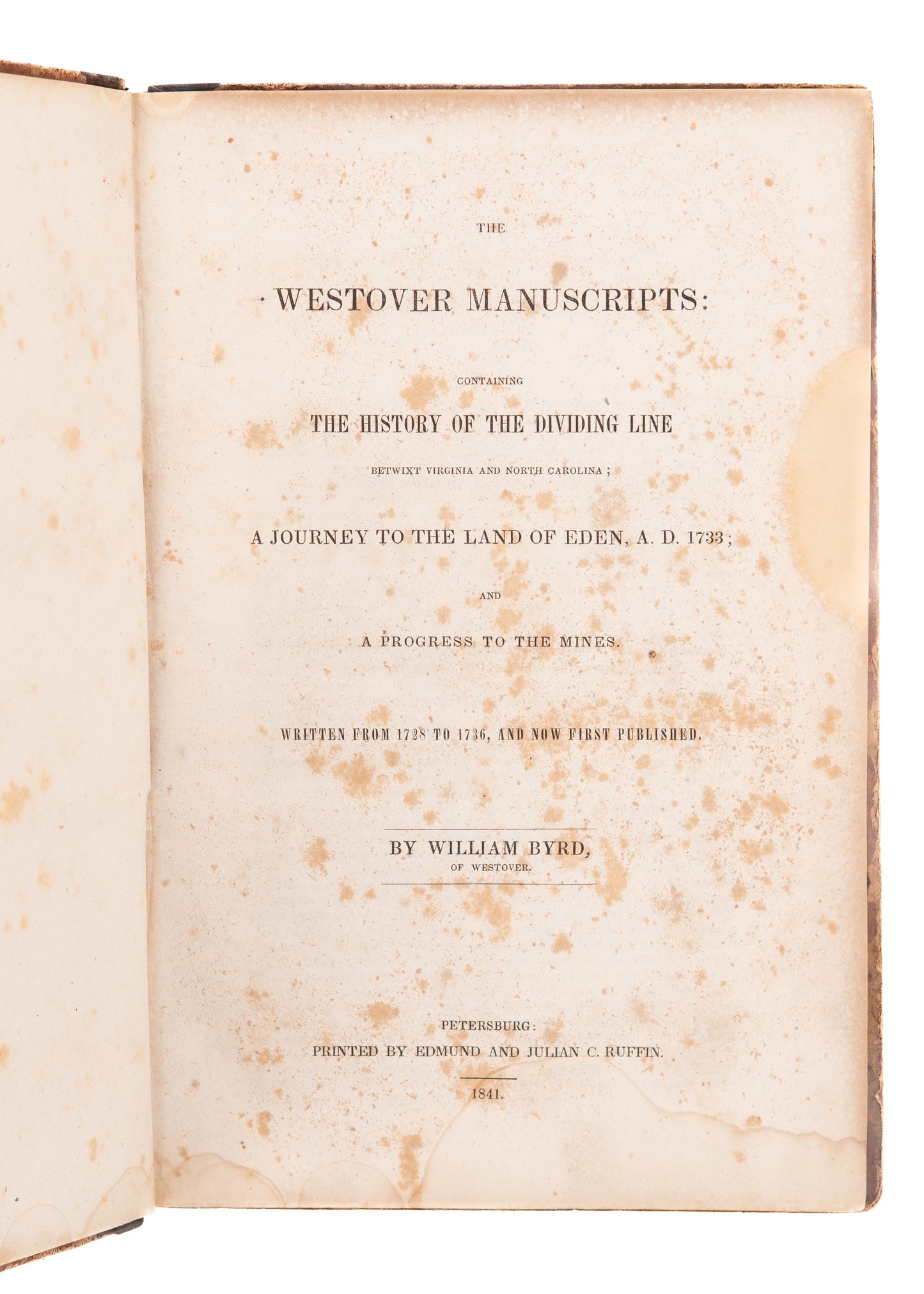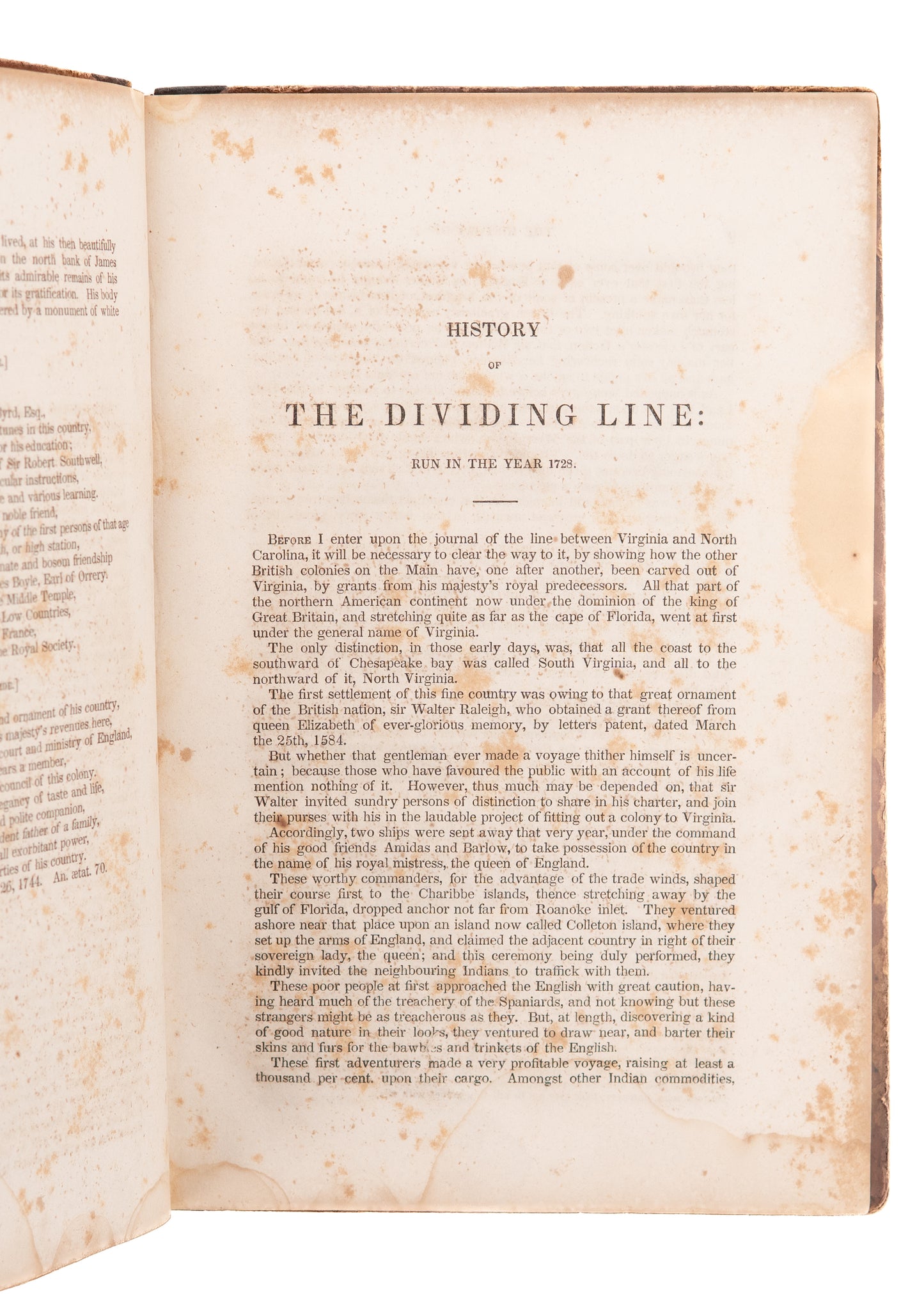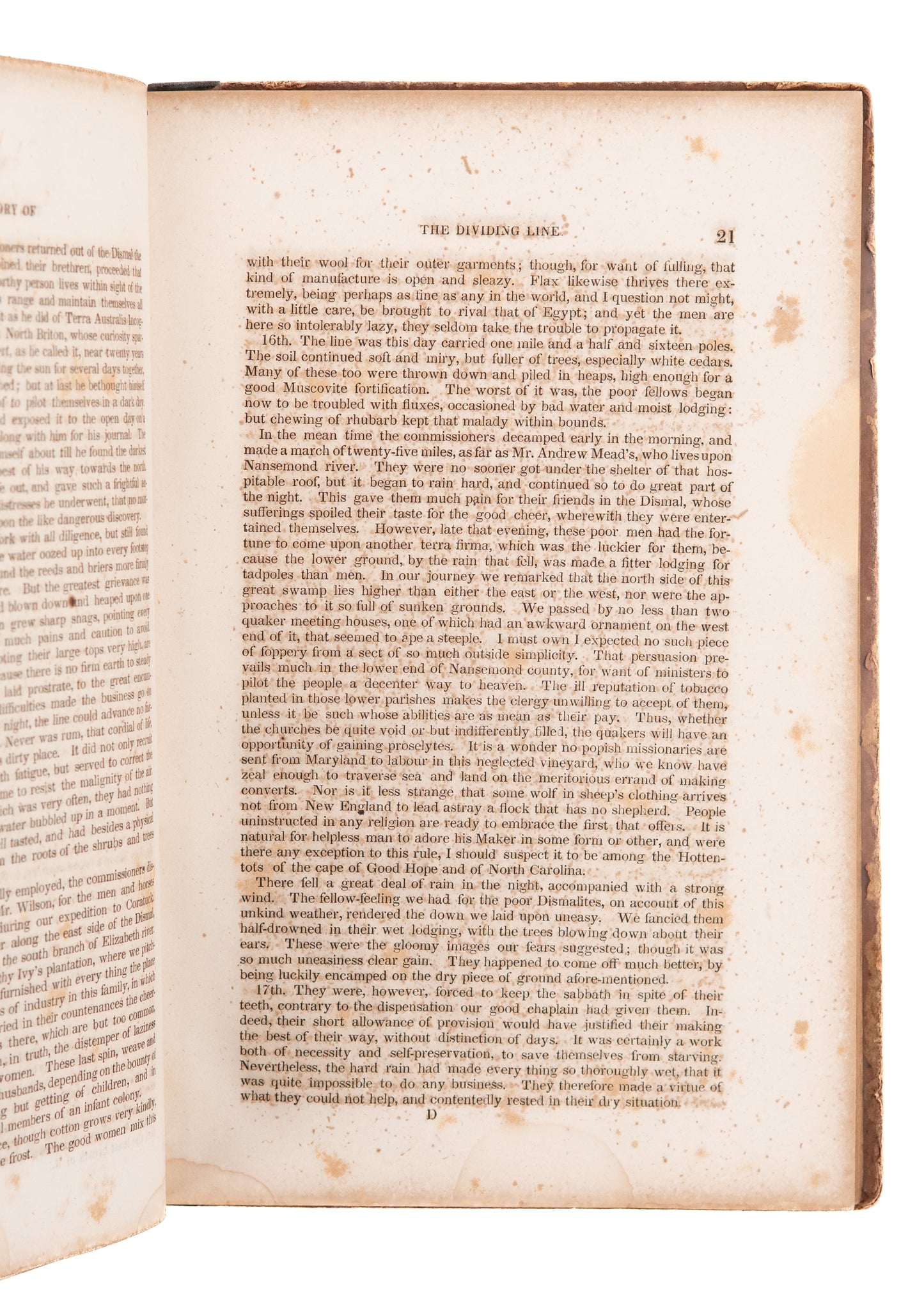Specs Fine Books
1728-1736 AMERICAN TRAVELOGUE. Owned by and Signed Twice by Creator of the Rebel Yell.
1728-1736 AMERICAN TRAVELOGUE. Owned by and Signed Twice by Creator of the Rebel Yell.
Couldn't load pickup availability
An Important 18th Century Travelogue of American Virginia and North Carolina Owned by the Confederate Creator of the “Rebel Yell.”
A desirable book in any state, this a fascinating example is it was the copy of Confederate Civil War “Hero” and the first man to ever give the Rebel Yell, James F. Preston. Signed once faintly on the front board, and more boldly on the ffep. Probably inherited by James F. Preston from his father, James P. Preston, a wealthy Virginia land-owner who would certainly have found the Westover Manuscripts of personal interest.
See here: https://civilwar.vt.edu/james-f-preston-possible-author-of-the-rebel-yell/
Byrd, William. The Westover Manuscripts: Containing the History of the Dividing Line betwixt Virginia and North Carolina. A Journey to the Land of Eden, A.D. 1733. And a Progress to the Mines. Written from 1728 to 1736, and Now First Published. Petersburg. Edmund and Julian Ruffin. 1841. First Edition.
A fascinating first edition imprint of three works by colonial pioneer to Virginia, William Byrd II [1674-1744]. Born in Charles City County, Virginia, Byrd's father, prompted by a letter from his wealthy uncle, Thomas Stegge, had emigrated from London at the age of eighteen, becoming heir to his uncle's Virginia plantation. When he was seven, William II was sent to England, where he lived with his maternal uncle and attended the Felsted Grammar School in Essex. After completing a classical education, his father wanted him to study business and trade under merchants in Rotterdam, Holland. But following a brief, unhappy stay there in 1690, Byrd persuaded his father to apprentice him to a London mercantile firm before entering London's Middle Temple in 1692. There he studied law and formed several important alliances with men such as Sir Robert Southwell, president of the Royal Society, and Charles Boyle, an English nobleman. Thanks to Southwell's influence, Byrd was elected a Royal Society fellow in April 1696, and the following year he was chosen to its council.
Because of his family name and social connections, William Byrd enjoyed a good deal of social and political influence in Britain and the Colonies. Having become a licensed attorney in April 1695, Byrd returned to Virginia the following year and was promptly elected to the House of Burgesses. Somewhat less successful in his romantic pursuits, perhaps due to his many debaucheries, Byrd eventually married Lucy Parke, daughter of Leeward Islands governor Colonel Daniel Parke, in 1706. After his father-in-law's murder in 1710, Byrd, who had already inherited his father's plantation in 1705, agreed to assume the Parke family debts in exchange for acquiring the family's extensive Virginia land holdings. However, the amount due was much larger than Byrd anticipated, and the debts plagued him the remainder of his life.
Over the course of his lifetime, Byrd resided in England on five separate occasions, spending at least thirty years there. In 1715 he returned to London, where his first wife succumbed to smallpox the next year. While in England, Byrd was a spokesman for the Virginia Council before the Board of Trade, challenging Virginia Governor Alexander Spotswood's policies that had diminished the council's authority as the General Court. To avoid dismissal as a councilman, Byrd returned briefly to Virginia, reconciling with the governor at the Board of Trade's behest. Traveling back to England in fall 1721, Byrd began the protracted process of finding a new wife. Following his unsuccessful attempts to court at least three wealthy British heiresses, he finally married Maria Taylor in 1724. Two years later, he moved permanently to Virginia, where he experimented with growing different tobacco strains and resumed his seat in the council. Though he failed in his bid for governor, Byrd did become a member of the joint commission to survey the Virginia-North Carolina boundary line in 1728. Upon his August 26, 1744, death at his Westover estate, William Byrd—amateur physician, self-trained naturalist, and colorful statesman—left behind a considerable legacy: one of the finest private libraries, with over 3,600 volumes; extensive landholdings totaling 179,400 acres; and a literary corpus detailing plantation life in colonial Virginia.
Drawing on experiences from his travels west from the Atlantic coast, through the Dismal Swamp, and to the Roanoke River, Byrd penned four narratives recounting his experiences, describing the area's flora and fauna, and comically depicting backwoods life. Although the texts circulated widely among his friends in manuscript form, only in 1841 were they published by Edwin and Julian C. Ruffin under the title The Westover Manuscripts: Containing the History of the Dividing Line Betwixt Virginia and North Carolina; A Journey to the Land of Eden, A. D. 1733; and A Progress to the Mines. Written from 1728 to 1736, and Now First Published. Throughout the narrative, he offers astute observations on the region, the animal and plant life inhabiting this territory, as well as the native people he meets. Moving from the Dismal Swamp into Nottoway Indian country, he also gathers ethnological data, primarily from the guide and hunter Ned Bearskin. Ending the second expedition "within the shadow of the Chariky mountains," Byrd, having summarily discharged his duties and fulfilled the king's commission, closes his narrative with the declaration that his group has established the "true boundary betwixt the governments of Virginia and North Carolina."
Byrd's A Journey to the Land of Eden, dated September 11-October 16, 1733, relates the inspection tour of his Dan River land holdings. Briefly noting Byrd's founding of the Virginia cities Richmond and Petersburg, this account includes a diagram and survey of his North Carolina acreage. Similarly organized as a compilation of journal entries, the final text, On Progress to the Mines (dated September 18-October 9, 1732), closes with Byrd's visit to Spotswood's plantation and his investigation into Fredericksburg's iron mining. Clearly written for a London audience sharing his aristocratic notions of civilized behavior and refinement, Byrd frequently mocks those he encountered, particularly North Carolinians, who he felt had an "aversion to labor" and a "disposition to laziness."
Heavily rubbed, small section of spine cloth lacking, boards stained. Contents generally sound with some toning and foxing.
Desirable, and fantastic provenance.
Share
